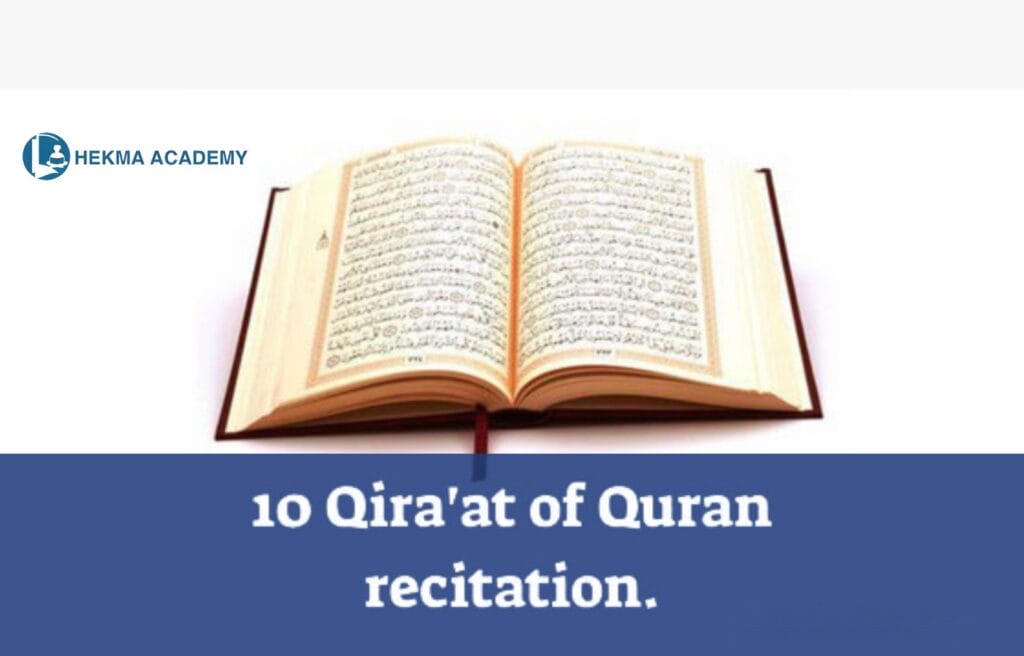Quran recitation speaks to more than fair perusing words for Muslims; it is a significant otherworldly encounter checked by profundity and quality. The Quran is not only a book but the strict word of God uncovered to Prophet Muhammad (peace be upon him), serving as a source of direction and internal peace for Muslims around the world. Its recitation has the interesting capacity to touch hearts, elevate souls, and light up minds, making it minutes of consideration and reflection that reshape confidence and reinforce resolve.
Do the various Quran recitation stem from different dialects?
The hadith already cited offers a significant knowledge into the assorted recitations of the Quran.
While numerous properties changed readings basically to the diverse lingos predominant at the time, it’s fundamental to realize that argumentative varieties aren’t the sole reason. Yes, tongues played a noteworthy part, but there were other fundamental reasons.
Taking the case of Hisham and Omar Ibn Al Khattab, both had a place in the Quraysh tribe but from diverse clans – Hisham from the Assad and Omar from the Adiy. Strikingly, the Quraysh, in spite of being one tribe, had a solitary lingo.
WHY LEARN TO RECITE QURAN?
Learning to Quran recitation holds significant noteworthiness for Muslims for a few reasons:
1- Otherworldly Association: Presenting the Quran develops one’s otherworldly association with Allah. It is considered an act of reverence and dedication that fortifies confidence and cultivates an individual relationship with the divine.
2- Conservation of Disclosure: The Quran was uncovered in Arabic, and learning to recount it jam the correct words and phonetics as they were uncovered to Prophet Muhammad (peace be upon him). This conservation guarantees the Quran remains unaltered and bona fide over centuries.
3- Understanding and Reflection: Presenting the Quran encourages understanding its implications and messages. Muslims accept the Quran as a direct way of life, covering different viewpoints of confidence, ethical quality, and conduct. Quran recitation helps in internalizing these lessons for individual development and development.
4- Community and Convention: Quran recitation is a communal home in mosques and get-togethers, cultivating solidarity among Muslims around the world. It is moreover a portion of a wealthy convention passed down through eras, connecting people to their social and devout heritage.
5- Remunerate and Endowments: Muslims accept there are monstrous rewards and favors related with recounting the Quran. It is accepted to bring peace of intellect, endowments from Allah, and otherworldly purification.
Overall, learning to recount the Quran is not as it were a devout obligation but moreover a source of peace, direction, and otherworldly fulfillment for Muslims endeavoring to live agreeing to its lessons.
What Are The 10 Qiraat?

The Quran is recited in 10 different ways, a consensus that most Islamic scholars and Shuyukh (Sheikhs) agreed upon. Initially, Abu Bakr Ibn Mujahid, in his book Kitab al-sabʿa fil-qirat, recognized only 7 distinct Qira’at.
However, the list expanded to 10 when Ibn al Jazari added three more reciters. This number discrepancy arises from the evolving recognition of varied recitation styles within the Islamic scholarly tradition.
Each Qira’at, totaling 10, further unfolds into two Riwayah, signifying that every Qirah Master has two distinct Ravi. Riwaya, Turuq, and Wujuh.
Here is an overview of each of the Ten Qira’at:
1- Qira’at Nafiʽ al-Madani:
Qirat Nafi Al-Madani stems from the recitation of Naafi Al-Madani, one of the seven transmitters of the Quran. Naafi belonged to Al-Madina in Saudi Arabia, and this Qirat reflects the linguistic nuances of the city. Widely approved by Islamic critics and philosophers like Al-Durr and Al-Nasai, Naafi’s recitation is considered trustworthy. Two direct transmitters, Qalun and Warash, further popularized Naafi’s Quranic recitation, with Qalun being personally taught by Naafi and Warash, an Egyptian, adopting Naafi’s style.
2-Qirat Ibn Kathir al-Makki:
qirat Ibn Katheer Al-Makki, developed by Ibn Katheer, aligns with the linguistic system of Mecca. The recitation has two transmitters, Al-Buzzi and Qanbal, both of Persian origin, facilitating communication. This Qirat represents a distinct style influenced by the linguistic characteristics of Mecca, contributing to the rich diversity of Quranic recitations.
3-Qirat Abu Amr of Basra:
Abu Amr Al-Basri’s recitation is acclaimed for its eloquence and resemblance to the companions of the Prophet. Abu Amr, well-educated and claiming unmatched knowledge, received education from renowned Islamic tutors. His recitation is considered reliable by many Islamic scholars, solidifying its significance in Quranic studies.
4-Qirat Ibn Amir ad-Dimashqi:
Qirat Ibn Aamir Ashami follows the linguistic variation of Syria, as he served as the Imam of the mosque of Damascus. Transmitted by Hisham and Bin Dhakwan, this Qirat represents the distinct linguistic features of the Syrian region during the reign of Al-Walid Bin Abd Al-Malik.
5-Qirat Aasim ibn Abi al-Najud:
Qirat Asim Al-Kufi reflects the linguistic system of Al-Kufa, which was learned from Abd-Alrahman Al-Sulami. Two notable reciters, Hafs and Abu Bakr, transmitted Asim’s Qirat, contributing to its acceptance and approval by many Islamic scholars.
6-Qiraat Hamzah az-Zayyat:
Qirat Hamzah Al-Kufi, influenced by the Kufi dialect, received both support and criticism. Transmitted by Khalaf Bin Hisham and Khallad Bin Khalid, the recitation acknowledged Hamzah’s proficiency as an Arabic grammarian.
7-Qirat Al-Kisa’i:
Qirat Al-Kisa’i Al-Kufi, developed by Al-Kisai, became prominent in Kufa after the death of Hamza. Transmitted by Al-Layth Bin Khalid and Hafs Bin Umar, the recitation is recognized and deemed reliable by Islamic scholars.
8-Qirat Abu Jaafar al-Madani:
Qirat Abu Jaafar, widespread in Al-Madina, earned its place among the 10 accepted recitations. Transmitted by Isa and Ibn Jammaz, Abu Jaafar’s recitation holds significance in Quranic studies.
9-Qirat Yaqoub al-Hadrami:
Qirat Yaqoub Al-Hadrami, while accepted among the 10 recitations, faced objections from some critics. Transmitted by Ruways and Ruh, Yaqoub’s recitation is associated with esteemed and hard-working tutors.
10-Qirat Yaqoub al-Hadrami:
Qirat Yaqoub Al-Hadrami, while accepted among the 10 recitations, faced objections from some critics. Transmitted by Ruways and Ruh, Yaqoub’s recitation is associated with esteemed and hard-working tutors.
Each Qira’a has its own rules of pronunciation and minor differences in the wording of certain verses while preserving the overall meaning and message of the Quran. These variations arose due to linguistic diversity in different regions of the Arabian Peninsula and were endorsed by Prophet Muhammad (peace be upon him) as valid ways of reciting the Quran.
The preservation of these Ten Qira’at ensures the authenticity and richness of the Quranic text across different linguistic traditions within the Muslim world. They are studied and recited by Muslims globally, contributing to the Quran’s universal appeal and adaptability across diverse cultural contexts.
The Spiritual Impact of Quran recitation:
The spiritual impact of Quran recitation is profound and multifaceted, enriching the lives of Muslims in several ways:
1-Connection with the Divine: Reciting the Quran is considered a direct form of worship that strengthens the spiritual bond between the reciter and Allah. It allows Muslims to communicate with their Creator, seeking guidance, solace, and forgiveness.
2-Inner Peace and Tranquility: The melodious verses of the Quran have a calming effect on the soul, providing a sense of inner peace and tranquility. Many Muslims find recitation to be a means of relieving stress and anxiety, as it redirects focus from worldly concerns to spiritual contemplation.
3-Spiritual Purification: Quran recitation is believed to purify the heart and soul. It encourages reflection on moral and ethical teachings, prompting individuals to strive for righteousness and spiritual growth.
4-Strengthening Faith: Regular recitation of the Quran reinforces faith and belief in Allah’s guidance. It serves as a reminder of divine presence in daily life, encouraging perseverance through trials and gratitude during times of blessings.
5.Healing and Blessings: Muslims believe in the healing power of Quran recitation, both physically and spiritually. It is often recited for those who are ill or facing difficulties, seeking Allah’s mercy and blessings for recovery and well-being.
6.Community and Unity: Quran recitation is a communal practice, often performed in congregational prayers and gatherings. It fosters a sense of unity among Muslims worldwide, as they come together to recite and reflect upon the same divine scripture.
Guidance for Life: The Quran provides comprehensive guidance on all aspects of life, offering solutions to personal, social, and moral dilemmas. Reciting and pondering its verses helps individuals navigate challenges with wisdom and clarity.
In essence, Quran recitation is more than mere vocalization of words; it is a transformative spiritual experience that enriches the soul, nurtures faith, and deepens the connection with Allah and the Muslim community. It remains a cornerstone of Islamic practice, revered for its timeless wisdom and profound impact on believers’ lives.
To conclude, after knowing the significance of recounting the Heavenly Quran every day for your heart, soul, and confidence, it’s time to begin your fulfilling travel with the book of Allah SWT. Anything your current level is, or anything your age is, you still have the chance to reinforce your relationship with the Quran.
We, at Hekma Academy, make it available for each Muslim to learn the book of Allah legitimately with Tajweed and act upon it. Contact us presently and select the Quran online course that suits you best!





